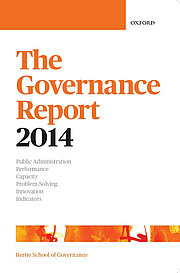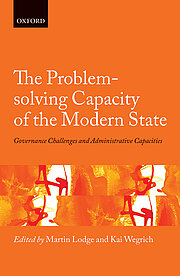
The Governance Report 2014
Publisher: Oxford University Press
Faculty lead: Kai Wegrich
The 2014 edition of the Governance Report develops a framework to explore the administrative capacities of the public sector in OECD countries, analyses how these capacities have been used to develop innovative policy approaches to key governance challenges, and explores governance innovations aiming to enhance governance capacities. In addition, the Report presents a dashboard of indicators that assess administrative capacities from multiple perspectives.
Downloads: Table of contents (PDF) | Preface (PDF) | Chapter 1 (PDF) | Executive summary (PDF)
Contributors: Martin Lodge, Piero Stanig, Kai Wegrich, Ramsey Wise

The Problem-solving Capacity of the Modern State: Governance Challenges and Administrative Capacities
Publisher: Oxford University Press
Editors: Martin Lodge, Kai Wegrich
Debates abound regarding the state’s ability to respond to a multitude of complex problems given increasingly dispersed forms of governing and institutional vulnerabilities. This volume advances these debates, first, by moving towards a cross-sectoral perspective that takes into account the cumulative nature of contemporary challenges; second, by considering innovations that seek to add problem-solving capacity; and third, by exploring the kind of administrative capacities required to encourage and sustain innovative problem-solving. Introducing a framework for understanding the four administrative capacities, it features chapters that focus on how these capacities have become stretched and have been adjusted; the way in which different states have addressed particular governance challenges; and finally, governance capacities that lie outside the state.
Downloads: Table of contents (PDF) | Chapter abstracts (PDF)
Contributors: Gerhard Hammerschmid, Eva Heidbreder, Michael Hill, Peter Hupe, Jacint Jordana, Michaela Kreyenfeld, Nico Krisch, Andrea Lenschow, Martin Lodge, Kira Matus, Salvador Parrado, Anika Rasner, Eva Sørensen, Vid Štimac, Jacob Torfing, Marco Verweij, Kai Wegrich
The Problem-solving Capacity of the Modern State: Governance Challenges and Administrative Capacities is also available on Oxford Scholarship Online.
Issues in focus
Administrative capacity and governance readiness
Governance readiness involves the capacity to adapt and show resilience in the face of acute and salient challenges. It is about problem-solving capacities that can be mobilised among state and non-state actors—and it suggests that government is not the sole site in which problem-solving occurs. In such a setting, the importance of "administration" has often been neglected. The Governance Report 2014 introduces a unique framework for better understanding how and where four types of administrative capacities appear in governance systems:
- Delivery capacity, dealing with the frontline of policy, i.e. the kind of resources required to make sure that rubbish is collected and water supplied;
- Regulatory capacity, addressing the control and oversight of activities such as telecommunications, infrastructure, and education;
- Co-ordination capacity, consisting of an ability to bring dispersed constituencies together to solve shared problems; and
- Analytical capacity, addressing demands on forecasting and intelligence that inform policy-making under conditions of uncertainty.
However, simply arguing that contemporary states and their bureaucracies should have "more" capacity is intellectually dishonest. For one, added capacity is inevitably a matter of resources, and more resources are never enough. More importantly, considerable disputes surround the definition of what "more" capacity actually implies, what kind of activities and practices represent "high" levels of capacity, and how capacity can be enhanced.
To find out more, order The Governance Report 2014 and The Problem-solving Capacity of the Modern State: Governance Challenges and Administrative Capacities.
Governance indicators
The administrative capacities dashboard developed for the 2014 Governance Report consists of four national-level sub-dashboards, one for each of the capacities highlighted in the Report: delivery, regulatory, coordination and analytical. All together, the four sub-dashboards comprise the most comprehensive snapshot of administrative capacities available. Comprised of data from multiple organisations and data providers, the dashboard includes raw indicators as well as thematic indexes that make it possible to address empirically questions about possible relationships between institutional design, the functioning of bureaucracies and governance output.
Two interactive tools are available: Interactive data explorer | Interactive map
Data from the indicators created for The Governance Report 2014 as well as any images generated by the interactive tools are free to use for research purposes. Please use the following citation: Hertie School (2014). The Governance Report 2014: Administrative Capacities Indicators. Hertie School: Berlin.
2014 indicators data set downloads: Codebook (PDF) | CSV | Excel (XLSX) | Stata (DTA) | R(RData)
2014 indexes data set downloads: Codebook (PDF) | CSV | Excel (XLSX) | Stata (DTA) | R (RData)
2014 factor analysis data set downloads: CSV | Excel (XLSX) | Stata (DTA) | R (RData)
Governance innovations
As part of The Governance Report 2014, governance innovations from around the world were selected in order to illustrate how novel approaches to problem-solving interact with administrative capacities in different sectors. These ten cases provide a diverse coverage of geographical regions, policy fields, leading actors and administrative capacities:
- Barcelona Social Inclusion Plan (Spain)
- Biodiversity Banking and Offsets Scheme (Australia)
- Broadband crowdfunding (Germany)
- Climate investment programmes (Sweden)
- Integration of renewable energies and e-mobility (Germany)
- Mobility partnerships (EU)
- Personal budgets (UK)
- Regional Greenhouse Gas Initiative (US)
- Toronto Region Immigrant Employment Council (Canada)
- Transport 2035 (US)
Visit our collection of governance innovations to learn more. For more detailed case studies, order The Governance Report 2014.


